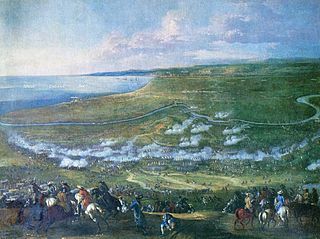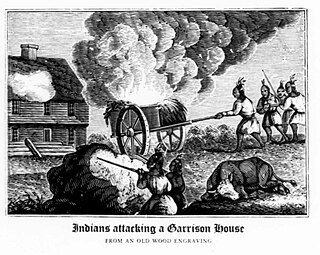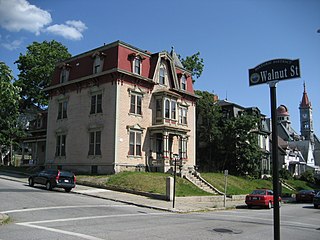
1676 (MDCLXXVI) was a leap year starting on Wednesday of the Gregorian calendar and a leap year starting on Saturday of the Julian calendar, the 1676th year of the Common Era (CE) and Anno Domini (AD) designations, the 676th year of the 2nd millennium, the 76th year of the 17th century, and the 7th year of the 1670s decade. As of the start of 1676, the Gregorian calendar was 10 days ahead of the Julian calendar, which remained in localized use until 1923.

Bristol, known from 1632 to 1765 as Pemaquid is a town in Lincoln County, Maine, United States. The population was 2,834 at the 2020 census. A fishing and resort area, Bristol includes the villages of New Harbor, Pemaquid, Round Pond, Bristol Mills and Chamberlain. It includes the Pemaquid Archeological Site, a U.S. National Historic Landmark. During the 17th and early 18th century, New France defined the Kennebec River as the southern boundary of Acadia, which put Bristol within Acadia.

Rehoboth is a historic town in Bristol County, Massachusetts, United States. Established in 1643, Rehoboth is one of the oldest towns in Massachusetts. The population was 12,502 at the 2020 census. Rehoboth is a mostly rural community with many historic sites including 53 historic cemeteries.

Plymouth Colony was an English colonial venture in America from 1620 to 1691 at a location that had previously been surveyed and named by Captain John Smith. The settlement served as the capital of the colony and developed as the town of Plymouth, Massachusetts. At its height, Plymouth Colony occupied most of the southeastern portion of Massachusetts.

Metacomet, also known as Pometacom, Metacom, and by his adopted English name King Philip, was sachem to the Wampanoag people and the second son of the sachem Massasoit. Metacom became sachem in 1662 when his brother Wamsutta died shortly after the death of their father. Wamsutta's widow Weetamoo, squa sachem of the Pocasset, was Metacom's ally and friend for the rest of his life. Metacom married Weetamoo's younger sister Wootonekanuske. It is unclear how many children they had or what happened to them. Wootonekanuske and one of their sons were sold to slavery in the West Indies following the defeat of the Native Americans in what became known as King Philip's War.

King Philip's War was an armed conflict in 1675–1678 between indigenous inhabitants of New England and New England colonists and their indigenous allies. The war is named for Metacom, the Wampanoag chief who adopted the name Philip because of the friendly relations between his father Massasoit and the Mayflower Pilgrims. The war continued in the most northern reaches of New England until the signing of the Treaty of Casco Bay on April 12, 1678.
Annawan or Anawan could refer to:

Benjamin Church was an English colonist in North America. He was a military leader of the historic predecessor of the United States Army Rangers, captain of the first Ranger force in America (1675). Church was commissioned by Josiah Winslow, the Governor of the Plymouth Colony, to form the first ranger company for King Philip's War. He later commanded the company to raid Acadia during King William's and Queen Anne's wars in the early 1700s, as French and English hostilities played out in North America. The two powers were competing for control in colonial territories. He was promoted to major and ended his service at the rank of colonel, as noted on his gravestone.

Minute Man National Historical Park commemorates the opening battle in the American Revolutionary War. It also includes the Wayside, home in turn to three noted American authors. The National Historical Park is under the jurisdiction of the National Park Service and protects 970 acres (392.5 ha) in and around the Massachusetts towns of Lexington, Lincoln, and Concord.

The Rehoboth Carpenter family is an American family that helped settle the town of Rehoboth, Massachusetts in 1644.

The Great Swamp Fight or the Great Swamp Massacre was a crucial battle fought during King Philip's War between the colonial militia of New England and the Narragansett people in December 1675. It was fought near the villages of Kingston and West Kingston in the Colony of Rhode Island and Providence Plantations. The combined force of the New England militia included 150 Pequots, and they inflicted a huge number of Narragansett casualties, including many hundred women and children. The battle has been described as "one of the most brutal and lopsided military encounters in all of New England's history." Since the 1930s, Narragansett and Wampanoag people commemorate the battle annually in a ceremony initiated by Narragansett-Wampanoag scholar Princess Red Wing.

Colonial Pemaquid State Historic Site is a publicly owned historic property operated by the state of Maine near Pemaquid Beach in Bristol, Maine. The site includes the reconstructed Fort William Henry, archaeological remains of 17th- and 18th-century village buildings and fortifications, and a museum with artifacts found on the site including musket balls, coins, pottery, and early hardware.

The Anawan Club Clubhouse and Caretaker's House are a pair of historic buildings in Rehoboth, Massachusetts, on the grounds of the Anawan Club, a private recreational club.

The Rehoboth Village Historic District is a historic district encompassing the historic rural village center of Rehoboth, Massachusetts. The village grew around an industrial site located on the Palmer River, whose waters powered several mills nearby. A modest rural village grew in the area between about 1750 and 1850, with the current church being built in 1839. Later in the 19th century institutional buildings, including Goff Hall and Blanding Library, were added. The village is centered at the junction of Bay State Road and Locust Street.

The Briggs Tavern is a historic building at 2 Anawan Street in Rehoboth, Massachusetts. Built about 1780 and now used as a private residence, it is the town's only surviving 18th-century commercial building. It was listed on the National Register of Historic Places in 1983.

The Highlands Historic District is a historic district roughly bounded by June, Cherry, and Weetamoe Streets, Lincoln, Highland, President, North Main, and Hood Avenues in Fall River, Massachusetts. The district lies just north of the Lower Highlands Historic District.

The Martin House is a historic house in Seekonk, Massachusetts.

Fort William Henry is located in the village of New Harbor in the town of Bristol, Maine. The fort was, in its time, the largest in New England. The fort was originally built in 1692 but destroyed four years later by New France in the Siege of Pemaquid (1696). A reconstruction was built in 1908. The fort was added to the National Register of Historic Places on December 1, 1969. Fort William Henry is now operated as a museum about the fort's history.
Pumham was one of Metacomet's chief advisors during King Phillip's War. He was sachem of Shawomet. He was described as "one of the stoutest and most valiant sachems that belonged to the Narragansett." He was friends with English settlers, but aligned himself with Metacomet when war broke out.
Annawan or Anawan was a sachem of the Wampanoag.





















